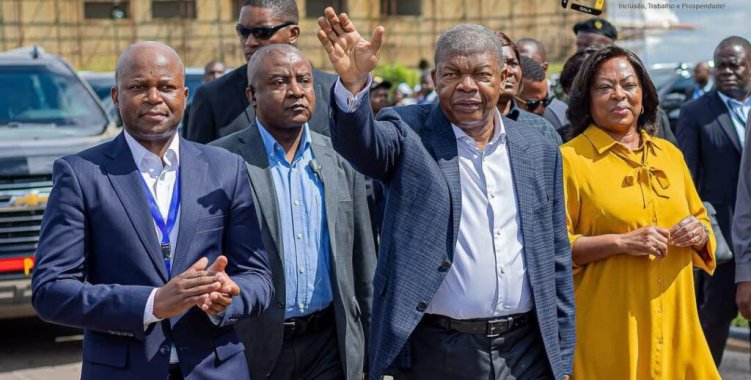The President was speaking to journalists after a two-day visit to Lunda Sul, where he inaugurated the 39-kilometre Saurimo Circular and reaffirmed that the railway branch line connecting Luena (Moxico) to Saurimo (Lunda Sul), in eastern Angola, “will happen”.
When asked about possible concerns about the conflict in the Democratic Republic of Congo (DRCongo) and a possible incursion by the M23 (a rebel movement fighting the Democratic-Congolese government forces) on the Angolan border, João Lourenço dismissed this possibility.
“But if it does happen, it will be easy to resolve. We will get a uniform and a weapon and hand it over to you and mobilise you for the Armed Forces. And that will be the problem solved”, he said ironically.
Angola and DRCongo share a vast land and river border of 2,511 kilometres with intense migratory movement of people and goods.
The head of state downplayed the fact that he had abandoned mediation, assuring that “this is not a sign of enmity with anyone at all”.
João Lourenço announced on Monday that he would step down from his role as mediator in the conflict between the Democratic Republic of Congo (DRC) and Rwanda, to focus on the priorities set by the African Union, an organization whose rotating presidency was recently assumed by Angola.
The Angolan withdrawal from mediation came after, a week ago, the Presidents of the DRC and Rwanda, Félix Tshisekedi and Paul Kagame, respectively, met in Doha with the Emir of Qatar to discuss the conflict between government forces and the March 23 Movement (M23), supported by Rwanda - according to the UN and countries such as the United States, Germany and France.
On that same day, on 18 March, a first round of talks between the M23 and a delegation from the Democratic Republic of the Congo was expected in Luanda, "an action aborted in extremis by a series of factors, including some external and unrelated to the ongoing African process", according to a statement from the presidency.
The surprise at what happened was expressed by the Minister of Foreign Affairs, Téte António, quoted by Jornal de Angola, who considered that "all efforts to resolve conflicts are welcome", but, he noted, African problems should have an African solution.
The armed activity of the M23 - a group made up mainly of Tutsis victims of the 1994 Rwandan genocide - resumed in November 2021 with attacks against the government army in North Kivu, having advanced on several fronts and threatening to escalate into a regional war.
In Lunda Sul, João Lourenço met with the local governing council, which, among other matters, analysed the implementation of the new Political-Administrative Division, which last year created three new provinces.
A set of diplomas were approved at the meeting, with emphasis on the new organic statutes of the provincial governments of Cuando, Cubango, Icolo and Bengo, Moxico, Moxico Leste, Luanda and the municipal administrations, in accordance with the new classification.
Regarding essential infrastructure and territorial organisation, preliminary studies were carried out and the areas for the construction of the future cities of Mavinga (province of Cuando) and Cazombo (province of Moxico Leste) were identified.







